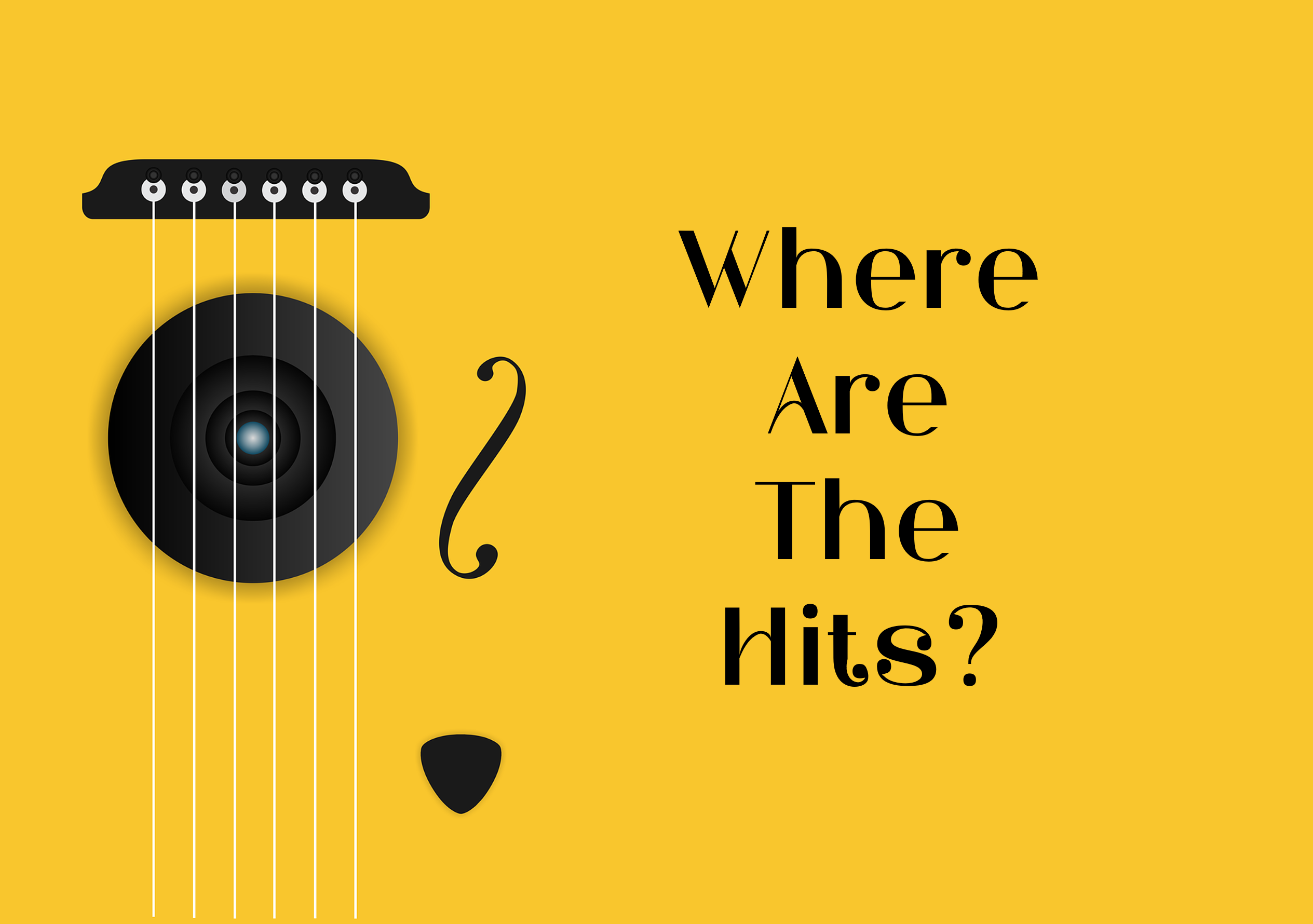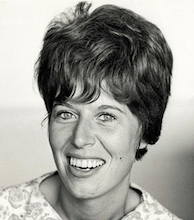
If you’ve worked in commercial radio in any music format for 4 minutes or 4 decades, you’ve no doubt heard this oft-spoken, much-believed-in simple motto:
PLAY THE HITS!
Whether you’ve worked in jazz, rock, country, classical, hip-hop, or even Triple A, you’ve not only heard it and uttered it, but you no doubt follow it. In radio programming, it is a mantra, the pathway to ratings and revenue.
These days, however, you may be having trouble following that plan because you simply cannot find the hits – especially current ones.
Over the past weeks, I’ve been spending much time analyzing music tests with clients in preparation for the Fall quarter, while getting a sense of where the trends are headed in my specialty areas of Rock and Alternative.
It’s an odd time, to be sure. Increasingly, programmers are perplexed by the way music is testing, especially newer music released in the past few years. And in many cases, even music from the past decade struggles to make the upper percentiles of the research. In many ways, this is nothing new. In both of the formats where Jacobs Media resides, it has been this way for several years now.
Why is this happening? Many have theorized that “today’s music ain’t got the same soul” – it just cannot compete with the classics: Zeppelin, Floyd, AC/DC, Queen, Metallica, and the like. On the ALT front, conversations run a similar course. Where’s the music that’s on the same plane with Nirvana, Green Day, the Chili Peppers, and Linkin Park? Why do so many newer bands and their songs fail to impact the way their predecessors did?
Lately, I’ve learned this isn’t a condition isolated to the Rock family of formats. To varying degrees, it’s happening in CHR, Country, AC – all formats that have been traditionally fueled by a steady supply of new stuff that keeps them fresh, vibrant, and culturally connected.
In this new era, there’s apparently more chips on the table for catalog music than current releases. Case in point: Pink Floyd’s body of work is now on the market, and analysts believe it could easily fetch $500 million. An article in Digital Music News handicaps the bidding war now underway.
Ironically, one of the band’s biggest 1970’s hits, “Money” preaches we should “grab that cash with both hands and make a stash.” OK, so there.
A new think piece by UK consulting group, MIDiA, attempts to put the new music conundrum in perspective. In “Music is not a level playing field – it is a field of all levels” by Tatiana Cirisano, a key point is made that new artists are faced with duking it out for attention, streams, and even sales with Pink Floyd…and Billy Joel, Adele, Taylor Swift, and Bruce Springsteen.
levels” by Tatiana Cirisano, a key point is made that new artists are faced with duking it out for attention, streams, and even sales with Pink Floyd…and Billy Joel, Adele, Taylor Swift, and Bruce Springsteen.
She notes that while streaming democratized music exposure, the market is oversaturated with product, making it difficult for artists to form coalitions of fans to gain any semblance of control over those algorithms.
Cirisano posits there are three classes of artists in the musical wild, all going after the same fans and their hard-earned loyalty…and money. But they’re playing by different rules:
- The Old Guard – These are the elites, the performers who became famous before there was streaming – Beyoncé, Aerosmith, Bon Jovi to name just a few. They sold tons of physical music for years, and their fame carried over into the streaming milieu.
- The 2000’s Kids – These performers hit it big back in the nascent years of streaming, when the music economy was still being sorted out. Cirisano points to Taylor Swift, Drake, and Ed Sheeran as good examples of artists who reaped the fruits of streaming while the medium was young, having already established their brands, their fans clubs, and their followings.
- The New Kids on the Block – We’re talking about all the up and comers, trying to make their fame and fortunes in today’s music morass. As Cirisano notes, they’re competing against the old pros in the other two categories, and it’s far from a fair fight.
Her analogy? It’s akin throwing a hot high school prospect on a practice court with LeBron James and Michael Jordan. And the end result is predictable. The “new kid” may have potential but doesn’t stand a chance against these two legends – G.O.A.T.s.
kid” may have potential but doesn’t stand a chance against these two legends – G.O.A.T.s.
Give the givens, for most consumers, new music discovery has become a flea market of catacombs where the payoff may not justify the effort. When music discovery becomes laborious, it may not be worth the time. In a new story in The Guardian, Daniel Dylan Wray askes the question: “Why are people in their 30s giving up on music?”
He makes the case that while his peers often ask the question “What are you watching?” as they hash over the new releases on Netflix, Apple TV, and Amazon Prime, fewer and fewer are asking the more traditional pop culture question, “What are you listening to?”
Wray wonders why in a world where people still discover new films, books, podcasts, and TV series, why the new music gene gets more regressive over time.
“…music seems to be something that more commonly slips away – or is even perceived as something you’re supposed to grow out of. Music is a key part of youthful identity formation: once your idea of yourself becomes fixed, perhaps by distinct markers like marriage and kids, the need for it slips away.”

But in a passing moment, Wray may have hit on a key driver that eludes Cirisano’s analysis. Wray mentions BBC DJ and producer, Andrew Weatherall, who passed away in 2020 at the age of 56. He talks about Weatherall’s “boundless curiosity, knowledge and passion for music, right up until his untimely death, is my personal benchmark and inspiration.”
Obviously in American radio in 2022, there are few “DJs” who are tastemakers on the airwaves. But many are still influential in shaping tastes and pointing to hits and trends.
Cirisano may not view radio as a key variable in this process, and as we know, radio and music are a lot different in the UK and around the world than here in the U.S.
Still, let’s not forget how radio once put music in a helpful order. It played the hits, exposed new music, and was the only place you could learn about what was new and next, this side of print magazines like Rolling Stone. There was even a clever, knowledgeable guy who counted down the 40 biggest hits each and every weekend. In other words, radio curated the world of current music.
When the industry rolled over and embraced streaming, it adopted a new business model that was modern, digitized, socially influenced, and with a low barrier to entry. Just like in podcasting, anybody and everybody can be a musician. And that’s part of the problem.
Standing out in the crowd is the challenge for fledgling artists, and while anyone can stream and be streamed, getting in front of the right fans at the right time is the hard part.
Radio’s long dominance of the pecking order of music exposure may have had elements of unfairness and even illegality over the years. But it was an efficient, effective, mass appeal way of learning what was charting in the biggest formats and genres. We all knew the hits. They could be heard across formats during any given hour on the radio each and every day.

Gatekeepers – that is, music directors – like the late Rosalie Trombley (pictured) of the legendary CKLW may have had their moments of arbitrariness. But you knew where you stood.
And “discoverers” like Donna Halper of WMMS/Cleveland who ended up breaking Rush in the States were checkered all over the radio industry.
Today, radio has trouble making, breaking, and even finding “hits” that reliably can hold an audience for three minutes.
Somehow, I still wonder if a renewed effort by both radio and “records” to collaborate more than duke it out over royalties wouldn’t be time and money better spent.
But these days, it’s become more about discovering the next classic artist willing to put their catalog on the block than it is discovering the next Jackson Browne, Dire Straits, or Brandi Carlile.
Pink Floyd may have had it right.
“Money, it’s a crime. Share it fairly, but don’t take a slice of my pie.”
- Media And Technology In 2025: Believe It Or Not! - April 18, 2025
- In Radio, You Just Never Know - April 17, 2025
- The Secret To Making A Great Podcast (And Great Radio) - April 16, 2025




Once upon a time, radio drove tastes…then it researched itself into a corner, looking for the narrowest common denominator until it “bored” it’s influence away…
Research is part of the story, Kurt, but I would submit that fear has been a bigger impediment. It takes courage and commitment to play new music with intent. Much of that has been lost in the PPM era.
You touched on something really important here: The importance of curation. In a world that’s largely algorithmically curated, the value of legit, flesh-and-bone, curation can’t be overstated, and it’s a real opportunity for radio. Too often, I hear front/backsells that tell listeners where an artist is playing or when a new album drops. Less frequent is the jock who tells us how the music makes them feel, or why the song matters. It’s the difference between treating music as a product and treating it as a lifestyle.
Great point Van O – but I would suggest that so many jocks just ignore the music and jump on prep sheet stories about wacky people in Florida. They don’t pick it or have any say in what is added from the corporate hill. We also are teasing, doing corporate contests, and plugging sponsors, hey who has time to talk about the music in your 15 seconds before the PPM meter goes off?
Well said, Dave. And rather than being used as an aid, prep sheets too often become primary content – a crutch that further genericizes radio. Thanks for the comment.
When talent was engaged and invested, jvo, the radio broadcasting industry was in a better place. Listeners love when their favorite personalities are engaged. It sadly has become something of a rarity. Thanks for the comment.
On the one hand, the desire to create songs that become an immediate success has led to music being disposable.
Songs now don’t have intros, outros or solo breaks.
On the other hand, the arrival and incontrovertible success of TikTok has meant that people no longer even want to listen to a complete song.
In short, many of the new songs have become what a few years ago we called, in a derogatory way, ‘novelties’.
Friends who have worked with her describe Taylor Swift as by far the hardest working artist they have ever encountered. She has always lived on social media and her career has always been totally focused on the fans she has met there.
She’s a rarity, Bob, but a treasure. Hard-working, smart, immensely talented, and fan focused. She could write the book on how to do it right.
Hey, Fred!
I agree with Tatiana Cirisano. We have new artists swimming in the pool with established artists, and it’s easy to get lost in that pool. And now, there are really no “guards” at the pool. It’s a free for all.
Especially with radio guys, with limited time, trying to put together a playlist for a week. Back in the day, we’d give the whole afternoon just for the music meeting. Now, that’s drastically reduced. Listening to new music is a treat for me, it’s not my job anymore. Even if it was, we can’t “break” artists or songs without permission or directive from our format captains. The game is changed, fewer are playing, giving less REAL numbers for research and fewer people to run your ideas by before adding a song. My real numbers comment is directed at corporate playlists. Not that they’re bad. They aren’t. Thing is, they’re not locally relevant, no matter what the consultant’s argument is. They’re nationally relevant. It was small markets, like mine, that used to do most of the testing of new songs that we then reported and larger markets saw our results and used that information to help decide to add or not add a song. This does, and always will, go back to consolidation and cutting the small markets out of the mix. This hold my beer moment was made worse by streaming and I-pods. When you can curate your own playlist, that makes you happy all the time, why do you need anything else? Until you crave new music.
Then you get the way overzealous programmers who add on streaming alone. That’s a whole other bag of cats that doesn’t work.
I go back to my tv streaming options here. Sometimes when trying to choose what to watch, I get fatigued and just turn on something familiar. I KNOW Doctor Who will make me happy no matter what. The new streaming things on Netflix, I might like it, might not, so I’m going with the Doctor. That explains the Pink Floyd and Springsteen things to me. Plus they’re retiring. Who WOULDN’T buy those catalogues if they can afford it?
Couple that with a pandemic where familiar made us feel better and bands couldn’t really be TOGETHER to create, we have a drought. Not that they couldn’t create, but it was a challenge. And let’s not forget how. many. people. died. Without a list of singers like Joe Diffie lost to Covid, how many were producers and such that we don’t hear about as much?
I want to go on record saying that there IS music just as good or better than the 70’s. For the love of all that’s holy, that’s very close to what my grandparents said about Lawrence Welk when I wanted to play them Abba. We, as radio professionals, have to STOP putting our preferences above our listeners. No wonder they don’t come to us anymore. It’s like my grandpa playing Guy Lombardi all the time. Eventually you grow to hate the guy. That is what we’ve done to epic bands like Zeppelin and Floyd. When I have a listener say if I hear one more Led Zeppelin song in my life it will be one too many. That’s our fault and it’s happening more and more all the time.
First, we open our minds and let them in. If you allow it, the hits will come.
Tammie, I always appreciate your heartfelt comments. I believe you speak for many workers “on the line,” doing their best in all sorts of markets. The system – both on the radio & “records” side has long been broken, for some of the reasons you mention. The two industries desperately need each other – but don’t seem to know it. Not collusion, but collaboration. Thanks for taking the time to comment.
I know that I’m a complete outlier but I can’t keep up with all of the fantastic new music that I keep hearing, and it’s not just music by “kids”.
Check out Hot Laundry, a female fronted “Garage Soul and Rock n Roll” band from San Francisco. Their most recent album was produced by Neil Young.
There’s Eden James from NYC who plays old-school, classic rock. His most recent album, “All The Good Blank Are Taken” was co-produced with Tim Leitner and picked up 26 global industry awards in 2021.
Bands like HotWax, Berries and GÉNN from the UK, The Short Fuses from Minneapolis, The Chelsea Curve and The Dents from Boston are all female fronted bands that are making accessible and fun rock’n’roll.
The good music is there. Maybe none of the above mentioned bands will ever rise to the level of Pink Floyd or Led Zeppelin but that’s okay.
There are plenty of left-field sources (including, yes, broadcast ones) for finding newer music: I’ve plugged some non-U.S. (and sometimes bilingual) Classic Hits stations–one of which being Portugal’s M80, where I discovered the older hits (i.e., from about a decade ago) from Amor Electro. Because of that, I came across someone else who discovered the band via one of their newer hits–being played on New Bedford’s Portuguese-language WJFD.
https://www.youtube.com/watch?v=8YWoBr58kiQ
You hit a home run again, on this one Fred, right on point and illuminating. It’s something I’ve put a great deal of thought into over the last year. Quite frankly, I could write extensively about it because I’ve been trying to find a workaround. There are a lot of perspectives, and too many are subjective to the person. In the end, being that it’s linked to the money revenue side, that’s where the decisions come from. That comes from embracing the PPM model and something I’ve fought for years to overcome as an artist and now as a label. It’s such a tiring battle.
Thank you for your insight and thank you to the people making comments, such great information.